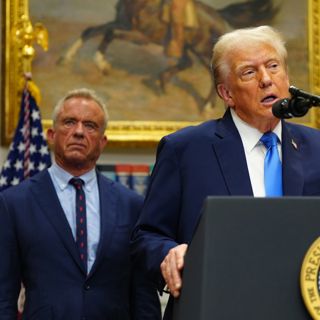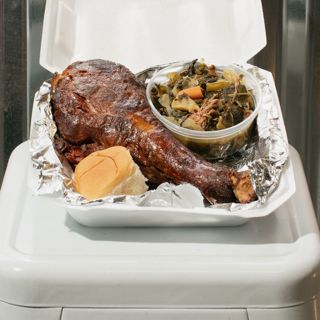
The Indictment of James Comey
A grand jury indicted James Comey, the former F.B.I. director, on Thursday night. It is a case that President Trump has personally demanded that federal prosecutors pursue despite their own doubts about whether Mr. Comey committed a crime.Devlin Barrett, who covers the Justice Department and F.B.I. for The New York Times, explains what’s in the indictment and what that means for Mr. Trump’s ongoing campaign of retribution.Guest: Devlin Barrett, a New York Times reporter covering the Justice Department and the F.B.I.Background reading: A grand jury indicted Mr. Comey, a longtime Trump target.With the indictment, Mr. Trump is getting the retribution he wanted but shattering norms.For more information on today’s episode, visit nytimes.com/thedaily. Transcripts of each episode will be made available by the next workday. Photo: Doug Mills/The New York Times Subscribe today at nytimes.com/podcasts or on Apple Podcasts and Spotify. You can also subscribe via your favorite podcast app here https://www.nytimes.com/activate-access/audio?source=podcatcher. For more podcasts and narrated articles, download The New York Times app at nytimes.com/app.
26 Sep 30min

The U.S. Keeps Killing Venezuelans on Boats. Is That Legal?
The U.S. military has blown up three boats in the Caribbean Sea in the past three weeks, killing 17 people aboard.Each time, President Trump has claimed that the boats were carrying drugs to the United States and that those killed were “narcoterrorists.” But he has offered no concrete evidence to back up this claim.Charlie Savage, who covers national security for The New York Times, tells us what he has learned about what may be the true objective behind these airstrikes and whether any of this is even legal.Guest: Charlie Savage, who writes about national security and legal policy for The New York Times.Background reading: Last week, Mr. Trump said the U.S. military had attacked a third boat suspected of carrying drugs, killing three.He has claimed the power to kill those suspected of drug smuggling.For more information on today’s episode, visit nytimes.com/thedaily. Transcripts of each episode will be made available by the next workday. Photo: Elizabeth Frantz for The New York Times Subscribe today at nytimes.com/podcasts or on Apple Podcasts and Spotify. You can also subscribe via your favorite podcast app here https://www.nytimes.com/activate-access/audio?source=podcatcher. For more podcasts and narrated articles, download The New York Times app at nytimes.com/app.
25 Sep 35min

The U.A.E. Got A.I. Chips. Trump’s Inner Circle Got Crypto Riches.
President Trump and his inner circle are making millions of dollars from agreements that intersect with America’s national security interests, a New York Times investigation found.Eric Lipton, who wrote the article, explains why these conflicts of interest are unlike anything we’ve seen before.Guest: Eric Lipton, an investigative reporter for The New York Times.Background reading: Read the full investigation here, or see five takeaways.For more information on today’s episode, visit nytimes.com/thedaily. Transcripts of each episode will be made available by the next workday. Photo: Doug Mills/The New York Times Subscribe today at nytimes.com/podcasts or on Apple Podcasts and Spotify. You can also subscribe via your favorite podcast app here https://www.nytimes.com/activate-access/audio?source=podcatcher. For more podcasts and narrated articles, download The New York Times app at nytimes.com/app.
24 Sep 25min

Trump, Tylenol and Autism
During a televised news conference on Monday night, President Trump repeatedly gave out unproven medical advice that linked autism to Tylenol and childhood vaccines.Azeen Ghorayshi, a science reporter for The New York Times, explains what Mr. Trump said and what decades of scientific research actually tells us.Guest: Azeen Ghorayshi, a science reporter for The New York Times.Background reading: Mr. Trump issued a warning based on an unproven link between Tylenol and autism.What to know about painkillers, vaccines, genes and autism.For more information on today’s episode, visit nytimes.com/thedaily. Transcripts of each episode will be made available by the next workday. Photo: Tierney L. Cross/The New York Times Subscribe today at nytimes.com/podcasts or on Apple Podcasts and Spotify. You can also subscribe via your favorite podcast app here https://www.nytimes.com/activate-access/audio?source=podcatcher. For more podcasts and narrated articles, download The New York Times app at nytimes.com/app.
23 Sep 27min

Charlie Kirk’s Politically Charged Memorial
Conservatives from around the country flocked to Arizona on Sunday to memorialize the activist Charlie Kirk. The service included leaders from the highest levels of the U.S. government, including Vice President JD Vance and President Trump.Two clear strands emerged during the memorial addresses: a message of Christian unity, and a vow to fight political enemies on the left.Robert Draper, who covers domestic politics for The Times, explains how the collision of those two messages makes this a crucial moment for the MAGA movement.Guest: Robert Draper, a Washington, D.C.-based journalist for The New York Times, who writes about domestic politics.Background reading: Thousands flocked to Phoenix for Charlie Kirk’s memorial service.President Trump remembered Mr. Kirk as a martyr while attacking political opponents.For more information on today’s episode, visit nytimes.com/thedaily. Transcripts of each episode will be made available by the next workday. Subscribe today at nytimes.com/podcasts or on Apple Podcasts and Spotify. You can also subscribe via your favorite podcast app here https://www.nytimes.com/activate-access/audio?source=podcatcher. For more podcasts and narrated articles, download The New York Times app at nytimes.com/app.
22 Sep 31min

Sunday Special: What Makes a Restaurant Great?
This month, The Times released a list of the 50 best restaurants in America. The Food desk’s reporters, critics and editors crisscrossed the country from Portland, Ore., to Deer Isle, Maine, to scout places formal and casual, big and small, experimental and classic. Their survey is an evocation of what it’s like to dine out, right now, in America.On today’s episode, Gilbert sits down with the Food reporters Priya Krishna and Brett Anderson, two contributors to the list, for a veritable feast of dining wisdom. They discuss what makes a restaurant worthy of the 50 best list, how they go about finding those restaurants, and the dining trends they’re loving and hating in 2025.On Today’s Episode:Priya Krishna, reporter and video host for New York Times Food and CookingBrett Anderson, reporter for New York Times Food and CookingBackground Reading:America’s Best Restaurants 2025Photo: Chase Castor for The New York Times Subscribe today at nytimes.com/podcasts or on Apple Podcasts and Spotify. You can also subscribe via your favorite podcast app here https://www.nytimes.com/activate-access/audio?source=podcatcher. For more podcasts and narrated articles, download The New York Times app at nytimes.com/app.
21 Sep 1h 1min

'The Interview': How Reese Witherspoon Figured Out Who She Really Is
The actor and producer booked her first big role when she was 14 years old. More than 30 years later, she’s an entertainment-industry powerhouse.Thoughts? Email us at theinterview@nytimes.comWatch our show on YouTube: youtube.com/@TheInterviewPodcastFor transcripts and more, visit: nytimes.com/theinterview Subscribe today at nytimes.com/podcasts or on Apple Podcasts and Spotify. You can also subscribe via your favorite podcast app here https://www.nytimes.com/activate-access/audio?source=podcatcher. For more podcasts and narrated articles, download The New York Times app at nytimes.com/app.
20 Sep 51min

Jimmy Kimmel and Free Speech in the United States
The aftermath of Charlie Kirk’s assassination and the suspension of late-night host Jimmy Kimmel are creating concerns and conversations about the state of free speech in the United States.Rachel Abrams, Jim Rutenberg, Jeremy W. Peters and Adam Liptak, all journalists for The New York Times, discuss Mr. Kimmel’s removal and why the action is provoking fears and applause from different camps of a polarized country.Guest:Jim Rutenberg, a writer at large for The New York Times and The New York Times Magazine.Jeremy W. Peters, a national reporter for The New York Times who focuses on free speech and the politics of higher education.Adam Liptak, who covers the Supreme Court and writes Sidebar, a column on legal developments, for The New York Times.Background reading: The Trump administration has wielded its full toolbox to bring media to heel.What to know about “hate speech” and the First Amendment.In Charlie Kirk killing, finger pointing began before the evidence was in.For more information on today’s episode, visit nytimes.com/thedaily. Transcripts of each episode will be made available by the next workday. Photo: Samuel Corum for The New York Times Subscribe today at nytimes.com/podcasts or on Apple Podcasts and Spotify. You can also subscribe via your favorite podcast app here https://www.nytimes.com/activate-access/audio?source=podcatcher. For more podcasts and narrated articles, download The New York Times app at nytimes.com/app.
19 Sep 30min





















